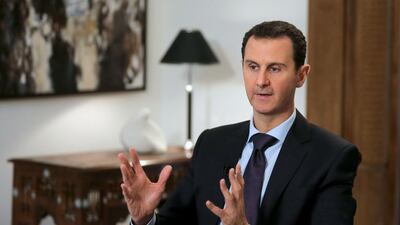BEIRUT // The first ceasefire of the Syrian civil war offered “a glimmer of hope” Bashar Al Assad said on Tuesday, but warned his government was showing restraint despite provocative breaches of the truce.
The Syrian president’s comments came as regime and opposition forces blamed one another for violations that they say threaten the ceasefire’s success and future negotiations.
“We have refrained ourselves from retaliating in order to give [a] chance for the agreement to survive,” Mr Al Assad told German public broadcaster ARD. “That’s what we can do, but at the end everything has a limit. It depends on the other side.”
He also claimed that “the terrorists” had violated the truce “from the very first hour.” But despite his reservations, the Syrian president called the truce “a glimmer of hope.”
The interview was broadcast as the UN’s special envoy for Syria Staffan de Mistura announced that the next round of Syria peace talks will begin on March 9.
But the opposition’s High Negotiations Committee — the Riyadh-based body created to negotiate with the regime in peace talks — says future talks are in jeopardy if violations of the ceasefire by pro-government forces continue.
In a letter to UN secretary general Ban Ki-moon that was released Monday, HNC head Riad Hijab decried the government’s violations of the ceasefire and warned that “negotiations will be unfeasible” if things continue as they are going.
“If the ceasefire fails, that means there is no need for talks with the regime,” said Issam Al Reis, a spokesman for the Southern Front, an alliance of rebel factions in southern Syria.
Citing rebel units, journalists and other observers on the ground, the HNC claimed more than 70 violations of the ceasefire across the country by pro-government forces by Tuesday evening.
While the vast majority of the violations the HNC claimed were blamed on the Syrian army, Russian planes, foreign Shiite militias and local pro-government militias were also deemed responsible for a number of attacks.
“We expected a better situation, but we see many violations done by the regime and Russia,” HNC spokesman Salem Al Meslet told The National. “It is very important to prevent these violations. And I believe it’s the responsibility of the United Nations and the responsibility of the United States, because it’s the partner with Russia on the agreement of the truce, of the ceasefire.”
On Tuesday, Russia’s ministry of defence said it had counted 15 violations of the ceasefire so far.
However, Russia’s statement appeared to count attacks by ISIL and Al Qaeda’s Syria branch Jabhat Al Nusra — groups that are explicitly excluded from the temporary ceasefire deal due to their extremist ideology. Breaches by groups that had agreed to the truce were not explicitly mentioned in the statement.
Russia has said it has bombed several Jabhat Al Nusra targets in the days since the truce was enacted. But the Syrian opposition maintains that areas controlled by the Free Syrian Army have also been targeted by Russian jets in recent days.
While attacks by pro-government forces have plummeted in recent days under the truce, Damascus and Moscow continued to increase pressure on rebels through their statements on Tuesday.
The Syrian president called on opposition fighters to lay down their arms, promising that rebels would be granted full amnesty.
He further denied that pro-government forces were cutting off aid to rebel-held cities.
“How could we prevent them from having food while we cannot prevent them from having armaments?” he said.
Mr Meslet, the HNC spokesman, said that despite demanding that the Syrian government allow humanitarian access to get through as a precondition to the truce, it is still being blocked or redirected to government areas by the Syrian army, Hizbollah and other pro-government forces on the ground in a number of areas.
According to the Russian ministry of defence, Russian mediated meetings in Syria’s southern Deraa province led to more than 800 fighters from Jaish Al Islam, the Yarmouk Brigade and other unspecified rebel factions agreeing to stop fighting and return “back to the peaceful life.”
Also on Tuesday, Russia’s state-run Tass news agency reported that foreign minister Sergei Lavrov accused aid convoys entering Syria from Turkey of transporting arms to “terrorists” and called for the border to be sealed.
While remaining hopeful that the truce could lead to deeper negotiations with the government toward a settlement of the conflict, Mr Meslet said the international community needed to do more to make sure the truce was abided by and called on the opposition’s friends to help the rebels more if the war continues.
“We don’t want them to really come and fight on our behalf, but we want them to save the lives of Syrians there — to help us save the lives of Syrians there — and this only comes if they take really serious steps to stop these violations,” he said.
Mr Reis, the Southern Front spokesman, echoed Mr Meslet’s calls for international help in enforcing the ceasefire.
“Now we believe that the Russians are making more effort and more air strikes toward moderate opposition in the last three days — and they will continue increasing the amount of air strikes if nobody stops them,” he said.
If a negotiated settlement to the conflict fails, Mr Meslet said the rebels need what they have long been asking for from their friends in the international community for years: Weapons, specifically anti-air weapons to stop Russian and Syrian jets.
jwood@thenational.ae
* With additional reporting from Agence France-Presse

